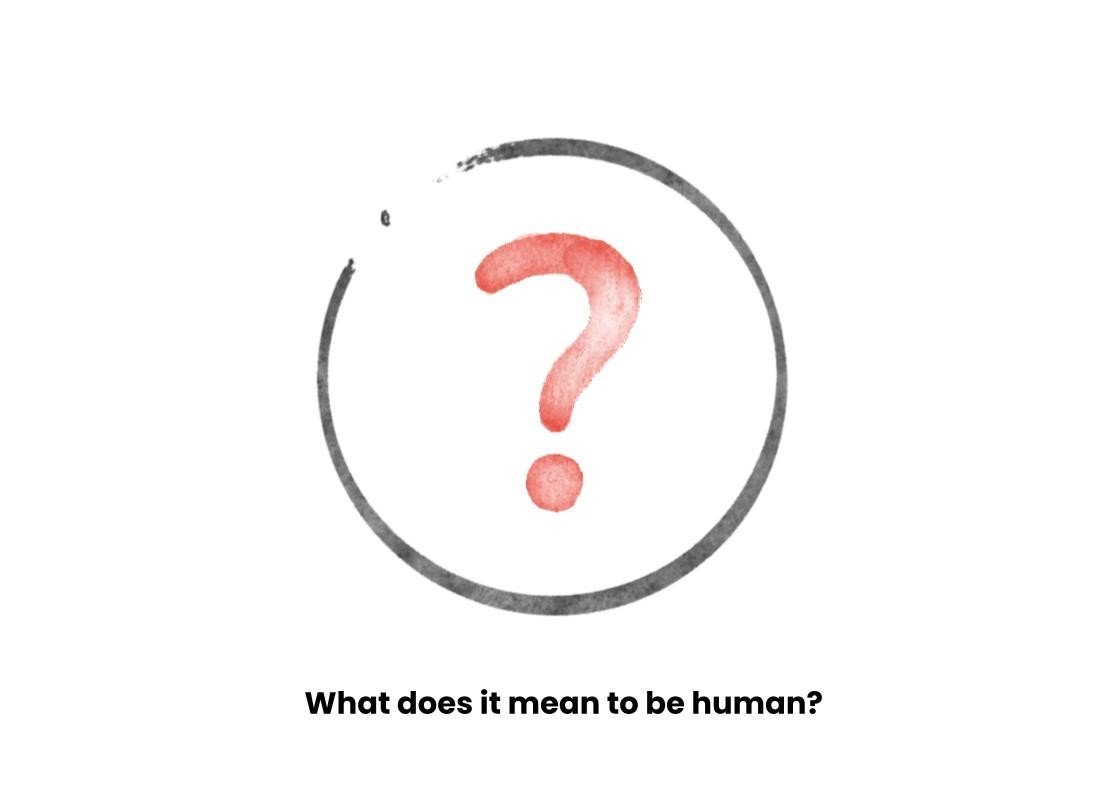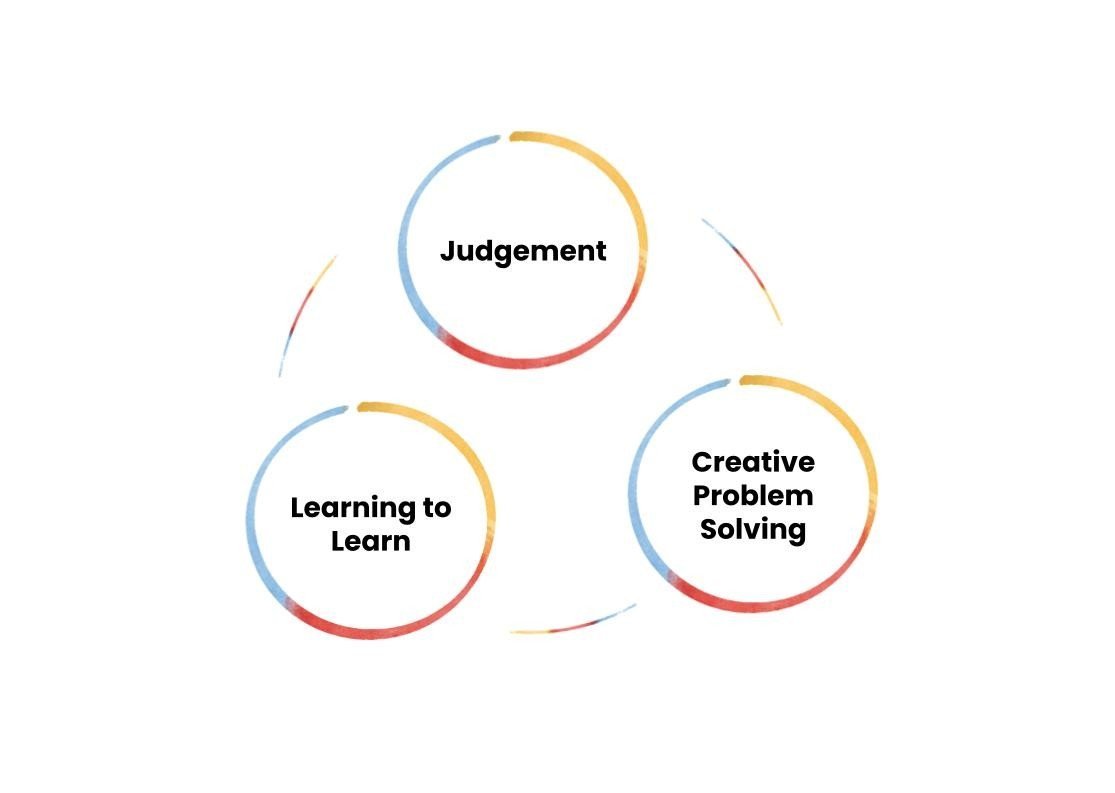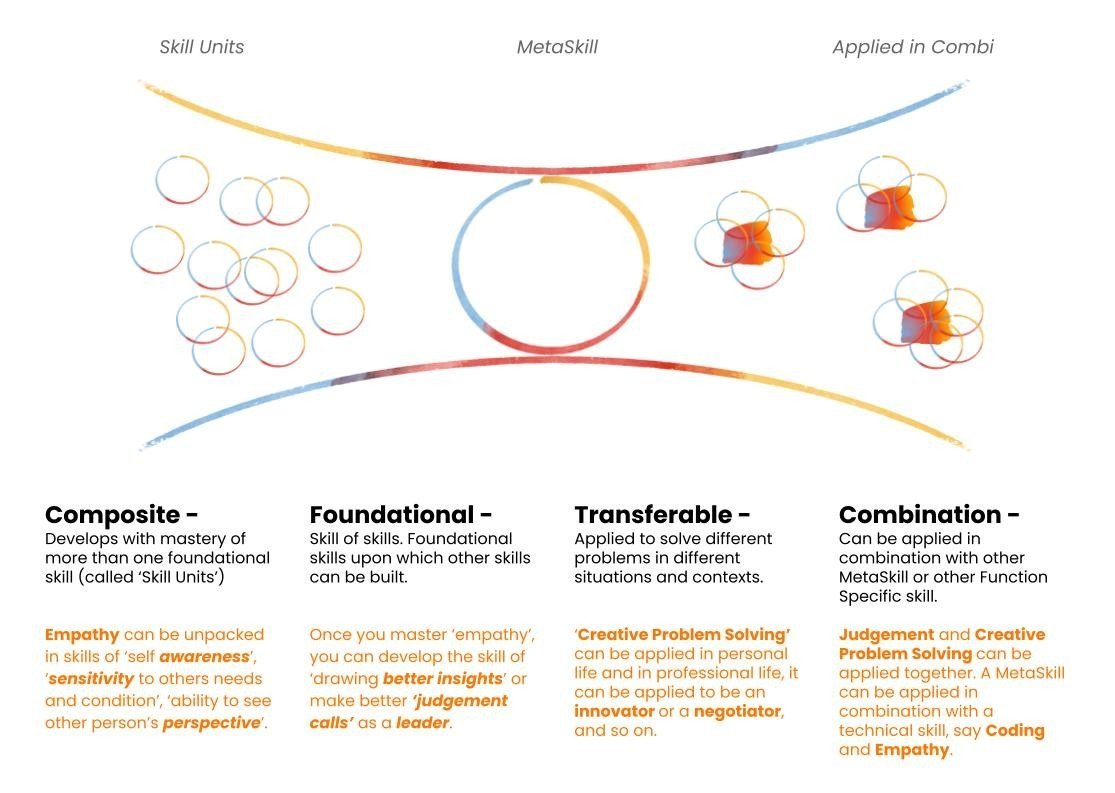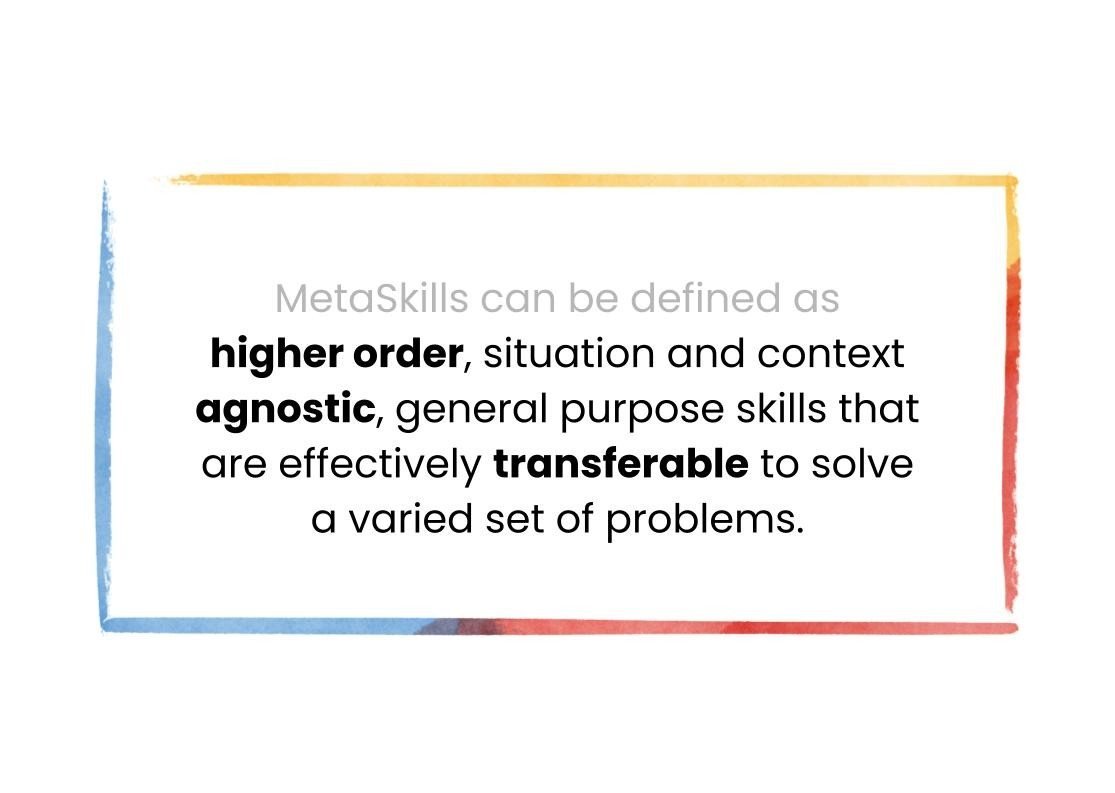Metaskills we need to bridge the learning gap
Nav Qirti
July 16, 2024
Our society & economy seem to be functioning on one leg
(Article 2 of 4)
I talked about the learning gap in my last article.
I had argued that :
--
“The ‘learning gap’ in our education system has led to a ‘skills gap’ in our workforce.
It seems that our ‘work’ world is running on one leg (‘Function Specific Skills’), while the other leg (MetaSkills) is tied. Our society and economy is running on half the human potential.
‘Function Specific Skills’ are not sufficient by themselves. To be successful we need to equally train ourselves in MetaSkills.”
(excerpted from the first article)
--
In this article I will delve more into the question: ‘what are MetaSkills and what are the MetaSkills that we need to master?’. Let’s start.
WHAT IT MEANS TO BE HUMAN
In a world where the future is uncertain and technology is unpredictable, how shall we navigate into the rapidly unfolding future?
“We used to take 10 year bets in banking. With the future so uncertain we can’t even take two years' bets now. We need to be responsive and adaptive” .[Paraphrased] Piyush Gupta, CEO, DBS Bank.
This question is in even sharper focus in a rapidly unfolding future
We can’t control the future (though we can be prepared for it). Soon, we might not be able to control technology*.
But being human is in our control. ‘What does it mean to be human?’ will be in even sharper focus.
[*when it becomes more intelligent than us or we don’t clearly know which technology will emerge in future and what are the associated skills we will have to master]
To live with technology, we could play to our strengths. By focusing on what makes us uniquely human gives us more odds to succeed and thrive.
Questions that we need to ask ourselves:
What does it mean to be human?
What is it that has made us successful so far (as a species)?
What are the skills or abilities we will need to remain successful (as a species)?
THE SERENDIPITOUS ANSWER
For me the answer was serendipitous. A few years ago, my then colleague Roma came to me during the course of a project and asked, “Boss, I have done six interviews, how many more shall I do?”
My answer was, “Please take a call”. Essentially, I was asking her to exercise her ‘judgement’ on the issue and make a decision, and then act on it to solve the problem she was in (which was executing a project successfully).
This led me to think, “What is of more value here, ‘Roma’s skill as a user researcher’ or ‘her ability in taking a call based on what she had researched’”.
I realised that her ‘judgement’ was of more (relative) value. Instead of outsourcing ‘judgment’ to me, who is someone more experienced than her, if she could develop the skill of ‘judgement’ herself, she becomes the leader. And that’s powerful!
‘Judgement’ is exercised in a certain context to make a decision to ‘solve a problem’.
Once you solve that problem you have a ‘pattern’ in your head to solve such problems.
You have now ‘learnt to solve this kind problem’. You can apply this ‘learning’ again.
There is a feedback loop.
Let’s take another case. Visualise a prehistoric man or woman - a snake staring at them or a lion about to pounce - if you ran you survived, if you froze you were dead.
Solving the problem of survival
By exercising ‘judgement’ to run you solved the problem of survival, and your brain got wired to run whenever you were in such a situation. You learnt. You acquired the skill of running to save your life.
This is how the human species has learnt everything we know today. One skill at a time. One discovery / invention at a time - fire, farming, engines, and so on.
FUTURE SKILLS = META SKILLS?
These two stories, one of my personal experience with my colleague (during the course of a user research project), and second a hypothetical one from prehistory (saving your life by running away from a lion) illustrate that skills that we needed in the past haven’t in essence changed much at a meta level.
Creative Problem Solving, Judgement and Learning to learn are the ‘Meta Skills’ - skills that are transferable to different contexts and times. In a way these skills are timeless.
Are these skills of the future*? We don’t know yet. Time will tell.
[Note: *This topic needs more research - whether these three really are the ‘MetaSkills’ that have made us successful as human species? Will these be the skills of the future as well?]
MetaSkills that have stood the test of time - are these skills of the future as well?
KEY FEATURES OF METASKILLS
The thesis that these three skills are the future skills gave me a starting point and a reference to dwell deeper into the concept of MetaSkills. I started to unpack to understand them more. It started to reveal a pattern.
MetaSkills are characterised by four key features:
MetaSkills are characterised by four key features
Composite - MetaSkill is a ‘composite’ of a set of other skills which I call ‘Skill Units*’. To master a MetaSkill you need to master the ‘Skill Units’ that constitute it.
For example, Empathy can be unpacked in ‘Skill Units’ of ‘self awareness’, ‘sensitivity to others needs and condition’, ‘ability to see other person’s perspective’, etc.
You need to ‘train’ yourself in each of the constituent ‘Skill Units’ to build the corresponding MetaSkill.
[Note: *Skill Unit - In most cases the Skill Unit is also a MetaSkill. We refer to a MetaSkill as a Skill Unit when it is the unpacked / constituent skill to build another MetaSkill. For example, Empathy is a MetaSkill, but it is referred to as a ‘Skill Unit’ in relation to Creative Problem Solving or Judgement. Similarly, Judgement is referred to as MetaSkill, but it becomes a ‘Skill Unit’ in reference to Creative Problem Solving and so on.]
Foundational - MetaSkill is a ‘skill of skills’. MetaSkills are foundational skills upon which other skills can be built. MetaSkill (s) can be a building block to develop other skills and capabilities.
For example, once you master ‘empathy’, you can develop the skill of ‘drawing better human need insights’ or make better ‘judgment calls’ as a leader.
Transferable - MetaSkills can be applied to solve different problems in different situations and contexts.
For example, empathy can be applied in user research as well in leading people and organisations, or in conflict resolution situations.
MetaSkill of Creative Problem Solving can be applied in personal life as well as in professional to innovate or to negotiate.
Combination - MetaSkills are generally applied in combination with other MetaSkill(s) or other Function Specific Skill(s).
For example, ‘empathy’ can be applied in combination with the skill of ‘communication’ (to deliver a user-centered message)
or
it can be applied in combination with a technical skill (writing ‘empathetic software code’ or designing an ‘empathetic product’).
You might have the skill to write software code, but you need the skill to empathise to create a product that really solves user problems.
DEFINITION OF METASKILL
This also led me to put a version of the definition of MetaSkills - ‘situation and context agnostic, general purpose, higher order skills that are effectively transferable to solve a varied set of problems’.
[Note: While researching on the topic of MetaSkills I discovered some work that has already been done in the field. There is a book by the name MetaSkills by Marty Neumeier. There is a EU funded study called MetaCoin project. There is a book written on ‘Judgement’. Howard Gardner of Harvard University has extensively researched and written on Theory of Multiple Intelligences. Perhaps there is more work which I have not yet discovered.]
MASTERING METASKILLS
How can we master MetaSkills? ‘Through experience’ is one answer.
But that will take a lifetime.
Instead of learning these skills reactively, can we learn them intentionally?
My thesis is yes, we can, if we follow certain steps diligently.
In the next article I will delve into 'how can we master MetaSkills?'







